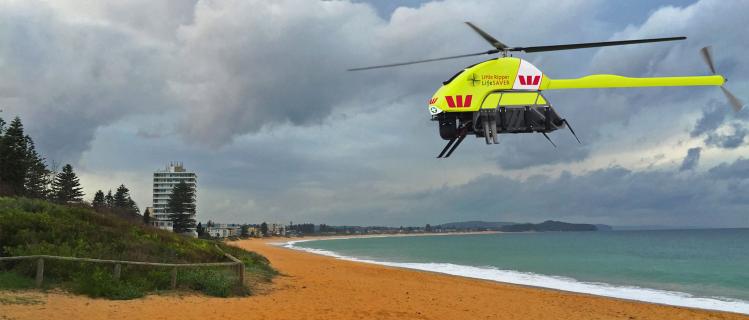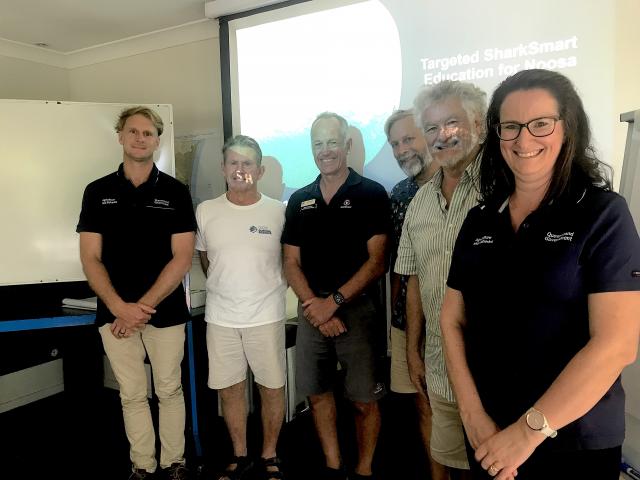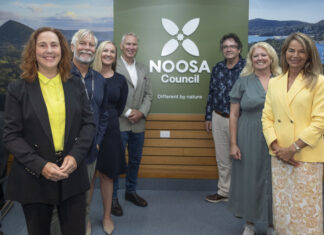Often critiqued by the southern states for lagging behind in modern shark mitigation and deterrent technology, Queensland issued a serious counter-punch at the beginning of last summer with the introduction of a new shark management plan.
After more than 60 years of almost total reliance on outmoded shark nets and drumlines, the new plan embraces a broad palette of new technologies like drones and smart drums, plus a new approach to awareness and education programs that emphasises sharks are not the enemy – when we go into the ocean we are sharing their space.
The forward scouts for this new strategy, branded as SharkSmart Qld, arrived in Noosa last week for a targeted education workshop hosted by the Noosa Biosphere Reserve Foundation, the idea being to have a two-way conversation with marine stakeholders and ocean user groups about localising the key messages of SharkSmart.
A spokesperson for Fisheries Queensland takes up the story:
“Fisheries Queensland’s Shark Control Program is working with the Noosa Biosphere Reserve Foundation to implement targeted SharkSmart education in the Noosa region.
“Targeted education initiatives, focusing on surfers and tailored to local conditions, will be developed. The project’s first workshop was held on Friday 25 March with representatives from Fisheries Queensland, NBRF, Noosa Council, Noosa World Surfing Reserve, Surf Life Saving Queensland, Noosa Surf Life Saving Club and North Shore Boardriders. Workshop participants discussed ways to share local knowledge and the latest scientific evidence about shark behaviours, to help inform surfers about local conditions and shark risk.”
So that’s the official version, for now, but in fact it was a far more interesting meeting than that would indicate, with locals involved in surf sports and surf life saving sharing information and views with those at the coalface of a new science and nature-based strategy for shark mitigation.
And let’s face it, SharkSmart is a difficult sell in Noosa where there has not been a fatal shark attack since 1961 when Brisbane dental student and surfer John Grayson Andrews had his lower left leg and left arm ripped off, apparently by a bronze whaler although more recent migratory information seems to contradict that.
If it happened today, the young surfer would almost certainly not have died, but back then he never recovered from the loss of blood and died in a Brisbane hospital a few days later.
The pub yarn version of the above is that it was 60 years ago and he shouldn’t have died, therefore Noosa doesn’t have a shark problem. But of course we do, as any local surfer, ocean swimmer or life saver can tell you.
One of the key messages of SharkSmart is not to breed fear but to promote greater awareness and reduce risk accordingly and, to sound out a local feeling for that, Shark Control Program policy and operations co-ordinators Dr Tracey Scott-Holland and Sam Fary were in Noosa while senior education officer Fiona Burnett joined remotely.
A key point that emerged early was that SharkSmart’s targeted messaging for surfers wasn’t going to wash, advising that surfers should only enjoy their passion where lifeguards could see them, avoid dawn and dusk sessions and never surf near rock ledges.
But this was where it got interesting because rather than dictate a “governmenty” one-size-fits-all approach, the SharkSmart people took it on board and asked more questions about alternative ideas.
They shared recent research on shark attack attitudes that divided the ocean-going population into four categories – scared believers, in between, positive preventers, and she’ll be right.
While the majority were believers or in between, it came as no surprise that the vast majority of those who identified as surfers were positive preventers or she’ll be righters.
Both as a surfer representative at the workshop and as a reporter, I was impressed by the way SharkSmart is using research models to inform its approach to awareness of sharks in our midst rather than breed a culture of fear.
And beyond that, the technological approach now being driven by the shark control program is offering new hope to marine conservationists that they will finally see the end of the old-school nets and drumline orthodoxy that has killed turtles and other sea-life on a regular basis for more than half a century.
This is a good start by Fisheries Queensland.









